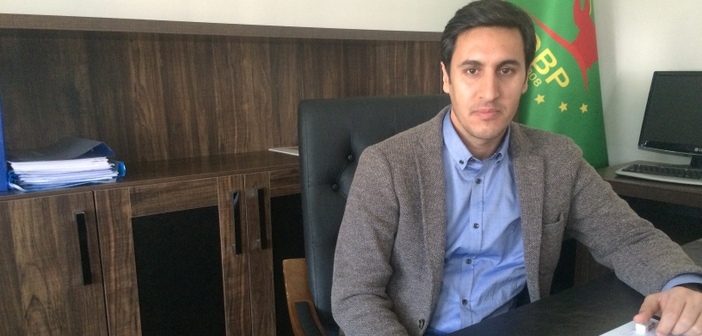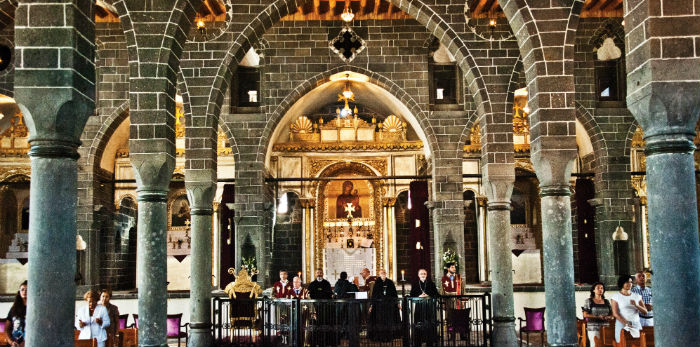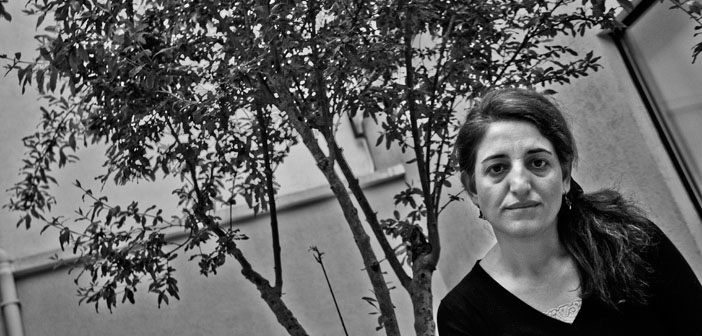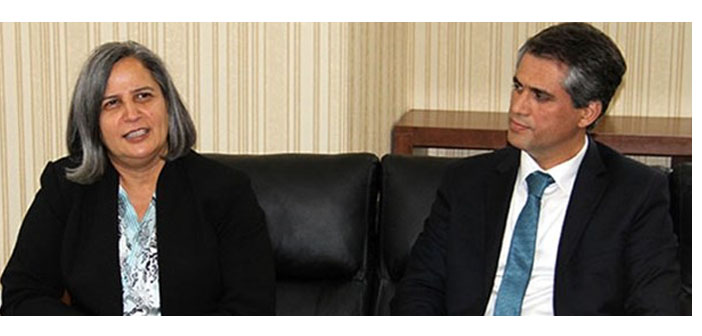Democratic Regions Party (DBP) co-chair Kamuran Yüksek told about the process that led to ditches and concerns of the people in the region. Yüksek thinks that if things go on like this, there might be no negotiation process again.
What is happening is discussed through the ditches. What is a ditch, what does it mean?
We should look at the basics of the issue. States have always been manipulative about it. They always make up justifications in order to impose their policies. Ditches are an example to this. They used ditches and barricades as excuses. In the past, they had different excuses; the children who throw stones, for instance. Or the people who use their right to protest and so on. States find excuses in order to oppress people, to inhibit anything that doesn’t conform to their will and to restrict the freedoms. Ditches are just another excuse. Discussing the issue through the ditches is to discuss it in accordance with AKP’s policies. We should discuss why there are ditches. The main problem is the fact that the Kurdish question remains; it hasn’t been solved yet. Kurds cannot receive education in their native tongue, their identity is not recognized. They cannot use their cultural, collective and political rights. Besides, they demand direct democracy. All these problems remain unsolved. This is not only Kurds’ problem; this is the problem of all people in Turkey who are not Turkish and Muslim. Problems of denial persist. Talking about the ditches without recognizing these problems is meaningless. We should discuss the Kurdish question, not the ditches.
The ditches prevail over all discussions, doesn’t it? After the elections on June 7, HDP became more visible, but right after that, we began to discuss the ditches. Are the ditches necessary? What caused the ditches?
In fact, we think that people couldn’t have interpreted and analyzed HDP well enough, including the majority of democrat people. It is not the case that the ditches ended this process. Recep Tayyip Erdoğan is the one who ended the process by renouncing the Dolmabahçe agreement. He renounced the agreement process. Then, he took actions in order to start a war. He renounced the result of the elections on June 7. The state, the government that considers this system legitimate didn’t accept the election results. How can one ignore this? People should have raised hell after that. CHP should have dug ditches around the election board because of this. By force of the practices, the president assigned the task of forming a government to the first party. After that, he should have assigned it to the second party, but he hasn’t done this and no one said a word. This is an arbitrary way of governing. Also, the government declared a war against Kurds. They say that they won’t let Kurds have any rights in anywhere, including Rojava. Now, they say that there is no Kurdish question, no parties to come to terms and no negotiation. Middle East is being reshaped now; there is a conjuncture that is reformed after 100 years. They want Kurds to wait without doing anything. Is it possible? The election on November 1 was held under war conditions and everyone swallowed it. They all accepted the results as if it is legitimate. We haven’t accepted it. We don’t want Erdoğan to determine our future as he wishes.
It has been discussed that there are local assemblies and courts. Can we say that the ditches are the result of these developments?
The ditches became the new symbol of this issue. Kurds don’t dig ditches in every place where they put up a struggle. Ditches are an excuse. They try to interfere in the new social discipline that we try to create here. We try to create alternative governmental, economic and social models by which people can meet their needs on their own. And also, juridical models. They criminalized these attempts. When I was discussing with a state officials, I said, “What do you want? They lightened the burden of your courts.” What happens if all the social problems would bring to the courts? These people formed popular assemblies and solve some issues in their own right; this is not a bad thing. The state is not omnipotent. When the state criminalized it and consider it as a “terrorist activity”, people immediately began to say that it is a bad thing. These issues should be discussed without using those notions. If a neighborhood in Bursa forms an assembly and begins to solve its own problems, everybody would applaud it. They solve their problems on their own, they help the poor people in the neighborhood and they share the job opportunities. If there is violence against women, they solve it. Are these activities wrong? They try to prevent drug abuse and drug dealing. If someone is engaged with such activities, they bring them to popular assembly; they condemn them and make them abandon such activities.
Was there such a mechanism in Diyarbakir?
Of course. This is what they interfere in now. The state tries that show that it exists. We discussed it with civil authorities here. They say “We are here, we can solve the problems.” You cannot. The state cannot involve in every issue concerning people. The state should accept this fact. On the contrary, the state should transfer these responsibilities to the local governments. The social life should be organized by the local governments. They should be able to make decisions, introduce laws and have budgets. We want to build such a system. HDP mentioned this in its election bulletin and it was pulled off because of that. HDP could not have developed it politically because of such oppressions. These are not the issues that the people in the west cannot understand, if they give it a chance.
There are criticisms against the West. Do you think that there is disengagement between Kurds and democratic forces in the West?
There is no disengagement. Our criticisms are a call for putting up a struggle together. We try to urge them to take action. We cannot wake up from this nightmare by waiting. This is reality. AKP government is like a night terror that haunts the entire country. We should fight against it. Our call is about that.
Well, is there a psychological disengagement between the Kurdish region and the West?
Yes, there is. We try to prevent this disengagement in the political level. This is about living together. We consider it as a strategy, but its ground becomes shaky day by day. The West haven’t reacted the state violence in recent months and this intensified the disengagement. We cannot say anything to Kurdish people anymore. We cannot say that Kurds and Turks are brothers and sisters. People say, “We are dying here and Turks say nothing.” That is why we have been trying to reach Turks for a while. We say, “If you want to live together with us, do something.” In the past, we had been saying that we want to live together with the people in the west. We had been saying that they don’t know what is really happening in our lands. We don’t say such things anymore. We want them to do something if they want to live together with us. Our chance for living together is about to be lost.
If the negotiation process starts again and Öcalan says fill the ditches, would you do it?
The burden becomes heavier day by day. The government states that they don’t want it. They talk about curfews that might last for a couple of months. We don’t know what will happen after that. We might not come to table again. If they kill thousands of people, there may be events and developments that make coming to table impossible. The government should take steps starting from now. If they take steps and Öcalan steps in, the problems could be solved. However, the government won’t do it. It wants a “cleaning.” After the cleaning, with whom will you come to table? People won’t accept the parties that the government chooses arbitrarily. This is a dead end. At the end, Kurds might want separation. This is really serious; things changed in the recent year. This time, Kurds will determine their fate on their own. A process through meetings and negotiations is not acceptable. First of all, the rights should be rehabilitated without discussion and the negotiations on the governmental model might provide solution. Rights like education in the native tongue are unquestionable. Issue like autonomous regions and transference of authority can be discussed, however.
Do you expect broader operations?
It is obvious that there will be broader operations is some regions. And there will serious struggles against them. You see what is happening in Diyarbakir. We have to understand that this might spread to the entire region and Turkey. This is nothing but action-reaction principle. Kurdish people have deep political awareness. Elections created a different atmosphere, but there are protests and actions everywhere in Diyarbakir. This process will spread. A new discussion will be started. Turkey accepted the laws of UN concerning self-determination. Thus, people have the right to determine their own fate. We want to determine our fate based on international legitimacy and UN laws. Turkey enters into a long-term process.
Are we going to discuss separation?
We don’t have to define it as separation. We are talking about determining our fate. UN also defines the territorial integrity. We also base ourselves on that. We don’t have to be separated, but there are alternative models. There are models of autonomy and federation. Turkey signed this agreement in 2003. If you say that people have a right of self-determination, then you should recognize it.





